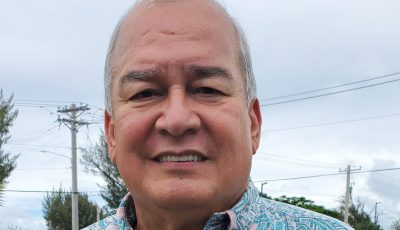‘Firming up NMI’s regulatory functions will avoid inclusion in China’s blacklist’
Strengthening the Commonwealth Casino Commission’s regulatory functions will help prevent China from including the CNMI in its “blacklist” of cross-border gambling tourism destinations, according to CCC executive director Andrew Yeom.
Speaking during a House Committee on Gaming hearing last week, Yeom said he has investigated and researched the “blacklist issue” and has learned that a way to avoid having the CNMI included in China’s “blacklist” is to have CCC monitor junket operators, regulate cross-border money transfers, among other things.
“We will strengthen the anti-money laundering initiative to make sure that we let the world know that we’re here to clear up all the regulations in terms of the Anti-Money Laundering concerns,” he said.
Yeom talked about the “blacklist” issue in response to a question from committee chair Rep. Edwin K. Propst (D-Saipan), who cited multiple news sources that China is looking at blacklisting several countries because of corruption or some other issues. He said the news sources disclosed that more countries will be named later in the blacklist.
“Are you concerned about how this affects the future prospect of gaming casino here in the Commonwealth?” Propst asked.
In response, Yeom said that China is primarily worried about money laundering and cross-border money transfers.
With the CNMI or CCC sending a strong message about being transparent and strong in its regulatory functions, Yeom believes this will be helpful to the casino industry. “And this is something that I have consulted with other experts in the world. That should help us to continue the casino operation,” he said.
Yeom said Imperial Pacific International (CNMI) LLC still has to improve its business plan.
Separately, Tao Xing, IPI senior vice president of Marketing and Public Affairs, said at the same hearing that the China Travel Bureau issued last Aug. 26 a sort of announcement about a plan to publish a gaming destination blacklist. “But so far the list hasn’t been published. We have been monitoring that closely,” Tao said.
From a business perspective, Tao said IPI needs to enhance its compliance in making sure that they’re rigorously following the rules against money laundering. “[We have to] make sure we have education and properly reinforce our education department. Make sure we have the full training,” he said.
Second, Tao said, they have to shift their business model from VIP market to mass market to premium mass so that they can accommodate the change.
“The last point I just want to make is that, given all the destinations, if you look at Australia, if you look at Singapore, our size is relatively small,” said Tao, adding that they are hoping that this will not trigger some significant attention from the Chinese government.



























